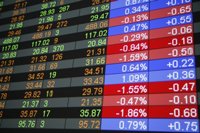 |
 |
|
|
Hyperinflation?
Lately, I've run across a number of articles warning people to prepare themselves for hyperinflation in the United States. Inevitably, these warnings are accompanied by comparisons to Germany's Weimar Republic and its infamous bout with hyperinflation in the aftermath of World War I. But is this really something to be worried about? To answer that question, we must first understand what hyperinflation is. In simple terms, hyperinflation is a rapid increase in the general price of goods and services, brought about as a result of a rapidly expanding money supply. Given the current worldwide credit crunch and subsequent actions by the Federal Reserve, a number of people are predicting a period of hyperinflation for the United States. These commentators point to the U.S. Treasury, the Federal Reserve, and the massive amounts of "liquidity" each institution is injecting into the marketplace. Their theory rests on the assumption that in its drive to end the current credit crisis, the federal government is essentially printing money in order to stimulate economic activity. Since the U.S. dollar is a fiat currency, meaning its sole value is derived from a holder's faith in the promise of the U.S. government to back it up, no limits exist on how much currency the government can print. The theory goes that as the U.S. government prints more and more dollars and extends more and more credit, the value of its fiat currency is eroded and the world is flooded with an excess supply of U.S. dollars. As a direct result, it takes more and more U.S. dollars to purchase goods and services. Based on these assumptions, quite a few websites are advising readers to be on the look out for hyperinflation and to prepare themselves and their families accordingly. As such, people are being encouraged to buy gold, silver, and other precious metals as a hedge against hyperinflation. This is sound advice if the diagnosis of hyperinflation is correct. But unfortunately, it's not. The Real ThreatI know I'll receive a barrage of emails from well-intentioned people who are convinced our current economic environment is setting people up for a nasty bout of hyperinflation. But it's just not true, and in good conscience, I can't let these claims go unanswered. United States citizens, and most people throughout the world, should not be preparing for the mythical threat of hyperinflation. In fact, they should be preparing for the exact opposite. The real threat of the current financial crisis is deflation - a general decrease in the price of all goods and services as a result of a contraction of the global money supply. In short, deflation is a net contraction of base money and credit while inflation and hyperinflation are the opposite. What's Really Happening...The hyperinflation argument is built on the faulty premise that the money supply will dramatically increase in the near future, while demand remains steady, thus increasing the general price of all goods and services. However, if we observe the world around us, we see the exact opposite forces in effect. This is because the money supply is a total of all currency, coin, and credit in the marketplace. Take note that physical U.S. dollars a person can actually hold in his hand account for only a small fraction of the money supply. The remainder of the money supply essentially consists of credit or IOUs held in the form of various financial instruments. In our fractional reserve banking system, the money supply expands in tandem with the expansion of credit. Yet, right now, all the indicators are signaling that the days of easy credit are over. The extension and acceptance of credit is contracting. Simply put, fewer institutions are willing to lend money, and fewer institutions and individuals are willing (or able) to borrow. As individuals and institutions default on their debts, the debt instruments (money) decline in value, effectively decreasing the money supply. While I've put this in very simplistic terms, the fact of the matter is that we're in the midst of a massive global credit crunch, the effective result of which is a worldwide contraction of the money supply. Furthermore, we're witnessing a tectonic shift in consumer spending attitudes as people turn away from the recent past behavior of borrow and spend to a more realistic view of work and save. This means total demand for consumer products throughout the economy is in general decline. While it's true that the United States is issuing new currency and coins at an unprecedented rate, this increase in the base money supply (physical currency) is increasing at nowhere near the pace at which credit and consumer demand are being destroyed. The net effect is deflation. In an earlier article, I wrote about the declining value of the U.S. dollar: "Anyone in touch with the world today knows that the dollar is losing value on an almost daily basis. The dollar has fallen relative to oil, gold, silver, and every other commodity on the planet. Although this fall won't last forever, it's a clear symptom of an ominous future for the dollar's underlying value." When the above statement was made, the world was near the pinnacle of the largest credit bubble in world history. The easy extension of credit over the course of several consecutive years dramatically increased the money supply. Since demand for the dollar remained relatively stable over that same time period, an increase in supply resulted in a lower price for dollars. In other words, the dollar lost value. As credit expanded (increasing the money supply along with it), it took more and more dollars to purchase gold, oil, silver, food, gasoline, houses, and just about everything. Essentially, the world experienced rampant inflation for the greater part of this decade. The idea that "peak oil" or increased demand or anything other than speculation and a general decline in the value of fiat currency was responsible for $147 a barrel oil is simply dead wrong. An ounce of gold will purchase approximately the same number of barrels of oil today as it would have purchased ten years ago. Inflation, caused by the rapid expansion of credit, was the driving force in the rising price of oil - as well as the rising price of just about everything else. What's Going On Now...When the massive credit bubble burst, it led to an immediate contraction of the global money supply - a contraction that is still in the process of unraveling. This isn't entirely the result of massive debt defaults, but also the product of a global race to hoard cash in order to service debt and make adequate provision for the future. Financial institutions are hoarding cash in order to guard against future losses and meet government reserve requirements. Corporations are hoarding cash as they watch past lines of credit disappear. And individuals are hoarding cash as they face the prospect of job layoffs as well as mounting debt obligations. So, not only is the money supply contracting, but demand for cash has increased. This demand for cash has had, and will continue to have, worldwide implications. In an effort to increase their cash holdings, corporations, hedge funds, and individuals have been selling assets. As a result, we've witnessed a general price decrease in just about every asset class. The price of gold is down. The price of oil and gasoline is down. The housing market is down, and the stock market is down. In such a world, the idea of hyperinflation is almost laughable. This isn't an environment that breeds hyperinflation. It's an environment of widespread deflation. The Deflationary SpiralUnfortunately, a deflationary environment is one of the worst economic situations possible. Consumers, faced with unemployment, or the very real prospect of unemployment, curtail discretionary spending, and the collective result of their efforts is lower profits for many businesses. Faced with decreased demand and poor cash flows, businesses throughout the economy respond by trimming their workforce. This, in turn, further derails consumer spending since the jobless are not a reliable source of customers for most businesses. In addition, the gainfully employed cut back on spending and hoard cash in preparation for the next round of layoffs. And on and on... The vicious cycle just feeds itself. This is the same situation which plunged the world into the Great Depression. So where does it all end? Unfortunately, government efforts to "fix" a crisis government created in the first place will inevitably fail. The Federal Reserve Board can cut the discount rate and the fed funds rate. Other central banks throughout the world can follow suit, and they have. Governments can guarantee bank deposits, buy up debt obligations, nationalize banks, and run the printing presses night and day. But in the end, all of these efforts will be futile in attempting to spur economic activity. Why? Because, in the end, governments can't make lenders lend and borrowers borrow. And until lenders are willing to lend, and borrowers are willing (and able) to borrow, the credit side of the money supply equation will continue to contract, and the economic landscape will continue to deteriorate. Collapsing debt obligations, rising foreclosures, rising credit card defaults, and rising unemployment are deflationary forces. And these events are not exclusive to the United States. The credit crisis is worldwide. Only after the debt bubble fully deflates (i.e. the foreclosures and bankruptcies end), then - and only then - will credit and economic activity expand. Once that happens, inflation will become a threat once again. But for the moment, inflation and hyperinflation are no where on the horizon. That said, we remain in a severe global economic downturn. So what does all this have to do with bible prophecy? Economic Crises Give Rise to DespotsIf history provides any indication, times of economic crisis are especially susceptible to the rise of demagogues and despots. Historically, political leaders take advantage of both perceived and real crises in order to increase the power and scope of government. The current credit crisis is no different. Already governments throughout the world have taken advantage of public fear and hysteria, drafting massive bailout packages to select corporations and industries, temporarily suspending the rules and regulations of financial markets, and forcing the nationalization of banks and other private industries. Recently, several prominent world leaders issued a clarion call to "rewrite the rules of international finance." In the meantime, each of these government power grabs occurs against the backdrop of a citizenry which is ever increasingly looking toward government as its Savior. In an environment such as this one, ambitious individuals have been know to push through bold and radical agendas with relatively little opposition from the public. A hungry and unemployed public places far more emphasis on jobs and security rather than freedom and liberty. Our last deflationary spiral, The Great Depression, is instructive in this regard. The economic deflation of the 1930?s gave rise to Adolf Hitler in Europe and Huey Long in the United States. Few people realize that Huey Long had successfully transformed Louisiana into his own personal police state. Had he not been assassinated in 1935, Huey Long might well have become President of the United States, effectively giving America its own dictator. History is clear, an economic crisis is fertile ground for a demagogue. The AntichristAs world leaders such as UK Prime Minister Gordon Brown issue calls for building a "global society," the stage is being set for the most infamous dictator in human history to seize power. Known as the Antichrist, the bible states that, in the last days, this man will come to control all of the world's economic activity: "He required everyone - great and small, rich and poor, slave and free - to be given a mark on the right hand or on the forehead. And no one could buy or sell anything without that mark, which was either the name of the beast or the number representing his name." Revelation 13:16-17 (NLT) In fact, he will exercise complete power over every person on earth: "And he was given authority to rule over every tribe and people and language and nation." Revelation 13:7 (NLT) This is why the current economic crisis is of dire consequence to the people of the world. While we can't know for sure whether this particular crisis will give rise to the Antichrist, we can be certain that the calls for increased global cooperation, global government, and governmental power over the free markets are setting the stage for a single man to seize control of the entire earth. How the World Can RecoverWhile most of the world anxiously looks toward government for answers to the current economic turmoil, Christians can move forward with bold confidence. Why? Because the bible provides us with the guiding principles for curing this economic ailment. If the rest of the world had followed, or would dare to follow, biblical principles in its financial dealings, then the current economic crisis would be a non event. While most of the world grew drunk on the excesses of debt, the bible issued dire warnings of its pitfalls: "Don't agree to guarantee another person's debt or put up security for someone else. If you can't pay it, even your bed will be snatched from under you." Proverbs 22:26-27 (NLT) "Owe nothing to anyone - except for your obligation to love one another." Romans 13:8 (NLT) "Just as the rich rule the poor, so the borrower is servant to the lender." Proverbs 22:7 (NLT) It's not too late for the world to start following the biblical principles of finance, but unfortunately, the world will follow its own path. ConclusionHyperinflation is not a concern right now. The world is in the midst of a deflationary spiral similar to that which caused the Great Depression, and this period will probably last several months or years. Nevertheless, Christians shouldn't be overly concerned with our preparations for dealing with the ills of this world. While we should make wise provision for the future, if we first pursue the Kingdom of Heaven above all else, then we will be capable of easily enduring any number of economic conditions, from deflation to inflation and hyperinflation. A life which glorifies Jesus Christ should not be overly concerned with the fleeting value of earthly wealth. For it can thrive in any condition: "Not that I was ever in need, for I have learned how to be content with whatever I have. I know how to live on almost nothing or with everything. I have learned the secret of living in every situation, whether it is with a full stomach or empty, with plenty or little. For I can do everything through Christ, who gives me strength." Philippians 4:11-13 (NLT) Regardless of the material condition in which we find ourselves, we should live our lives in the service of Christ. Our faith should not be in stock markets, pensions, or job security. Our faith shouldn't be in the provisions we've made or the gold and silver we've hoarded in anticipation of an economic collapse. Our faith should be in Christ alone. For this faith is the foundation of all the wealth we will ever have: "The rich think of their wealth as a strong defense; they imagine it to be a high wall of safety." Proverbs 18:11 (NLT) "Teach those who are rich in this world not to be proud and not to trust in their money, which is so unreliable. Their trust should be in God, who richly gives us all we need for our enjoyment." 1 Timothy 6:17 (NLT) Christians have far more than the riches of this world; we have the riches of Christ. "And anyone who believes in Him will never be disappointed." 1 Peter 2:6 (NLT) "Don't store up treasures here on earth, where moths eat them and rust destroys them, and where thieves break in and steal. Store your treasures in heaven, where moths and rust cannot destroy, and thieves do not break in and steal. Wherever your treasure is, there the desires of your heart will also be." Matthew 6:19-21 (NLT) Originally posted November 13th, 2008 Britt Gillette is the founder of End Times Bible Prophecy and the author of multiple books. Receive his book 7 Signs of the End Times for FREE when you sign up for his free Substack. Return to the top of Hyperinflation? Return to Bible Prophecy In The News Return to the End Times Bible Prophecy Website Homepage
|
Now Available! |
|
Search This SiteEnd Times TopicsBible ProphecyTechnologyAdditional TopicsArticle ArchiveAbout ETBPWe're Now on Substack!
|
||
|
| ||





